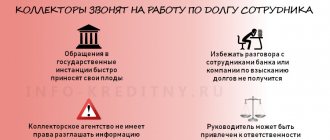Home /Articles on bankruptcy of individuals
Author of the article: Konstantin Milantiev
Last revised April 01, 2021
Reading time 9 minutes
Debt collection is legal if the collectors purchased the loan or microloan, have a work permit, and act within the law. In this article we will tell you whether to pay debt collectors before the trial or after a decision is made, how to check the legality of the collection and protect yourself from scammers.
Why debt collectors may demand a debt
Only a portion of collection firms engage in fraud and extortion and demand money illegally. Most organizations operate after receiving permission from the FSSP and inclusion in the register, on the basis of an assignment or agency agreement. That is, the claims against the debtor are legal, and the money paid will be used to pay off the debt.
The collection company operates according to the law:
- if she has a FSSP certificate, is included in the register;
- if there is an assignment or agency agreement;
- When collecting, Law No. 230-FZ and other regulations are observed.
The borrower has the right to know that his debt has been sold to collectors or transferred for collection through an agency. In 2021, creditors (banks and microfinance organizations) are required to publish information about the sale of debt on Fedresurs. To check whether the bank sold the debt to collectors, log in using the Unified Identification and Automation System and look at the Collectors tab in your personal account. If there is no information about the sale, call the bank for clarification. In addition, you will be sent a written notification by Russian Post.
The debtor has the right to verify the legality of the collection when communicating with the collection company - you can request information and documents, check information about the organization through the FSSP online service.
Written request for documents on the sale of debt to collectors - 11.6 KB
Until the bank or debt collectors provide a copy of the debt sale agreement, you do not need to pay the debt collectors.
If collectors demand payment without documents signed by the bank and the collectors, call the bank and clarify the situation.
When should you pay debt collectors?
You will have to pay if the collectors have confirmed the legality of the collection and you have the money.
If the obligation is assigned by assignment, the collection company becomes a creditor. You cannot pay the bank in arrears, since it is no longer a creditor. During agency, the collection agency is only a representative of the bank. In this case, you need to pay to the bank.
You can pay debts at the request of collectors under the following conditions:
- there is an assignment agreement;
- the collector provided information about his company and the amount of debt;
- the collection bureau is listed in the FSSP register;
- the money will be transferred to the current account.
Settlements with collectors are carried out only by non-cash method.
If a person asks you to hand over money to him, then you are faced with scammers. According to Law No. 230-FZ, each collection company is required to have a current account and indicate it in correspondence with debtors. Once you pay into your account, you will receive an official confirmation document.
Should I pay or wait for the court's decision?
The bank has the right to assign an overdue loan before judicial collection. Often debts for which the statute of limitations has expired are transferred to debt collectors; selling such debt is not prohibited, which is what banks take advantage of. If the bank did not go to court before assigning the debt, the collection company itself can file a claim and obtain a writ of execution.
Why is it better to wait for a court decision and not pay before filing a claim:
- at the time of the trial, the statute of limitations may have expired
- at the request of the defendant, the court will completely or partially reject the claim; - in court, you can reduce the interest if it is disproportionate to the loan
- for this, an application is also submitted to the judge; - If you are in a difficult financial situation, you can defer or spread out the payment of debt
- this will allow you to get a break, and then start paying off your debts.
Until there is a court decision, collectors will not involve bailiffs in the case. If the court has decided to collect the debt, collectors can work together with bailiffs - provide information about the defaulter, his property, work, location, etc.
Is it worth paying debt collectors after a court decision?
A bank or a collection company may sue after repurchasing the debt. This does not affect the debtor - he is the defendant. If collectors have a court decision, they can send documents for retention to the place of work, to the bank or to the bailiffs.
Even if there is a writ of execution or court order, the collector cannot
:
- seize property, take it as collateral;
- prohibit actions with vehicles and real estate;
- sell property.
Only bailiffs have these powers. Collectors can send documents to the FSSP, but usually use other collection methods.
Sample agreement with collectors on a discount - 10.8 KB
You can agree in writing to repay the debt before a certain date, asking for a discount - even if there is a court decision, collectors will discount the interest.
If there is no money, you can defer or install payments in court.
Bankruptcy allows you to completely get rid of debts. From the moment a bankruptcy case is opened, collectors have no right to make claims against the debtor. In 2021, bankruptcy will be recognized with debts of 300 thousand rubles. Find out more about the options and consequences of bankruptcy from our lawyers.
Should collectors be paid under an assignment agreement?
An assignment is a change of creditor of an obligation. If collectors have drawn up such an agreement, they have bought the debt and will collect money without a bank. We do not recommend immediately and categorically refusing to cooperate with a collection company. She can offer a convenient payment schedule, including deferment or installments, remove some interest, and provide benefits.
Before paying any assignment or signing any documents, be sure to consult with an attorney. It will help check the legality of the grounds for debt assignment and information about the collection agency.
Collectors are threatening to sue.
Going to court to demand repayment of a debt is the legal right of a collection agency. As a rule, the court in such cases sides with the plaintiff.
Legal costs are added to the amount of debt. When the decision has already been made, the case is transferred to the FSSP.
To collect debt, bailiffs apply a set of measures to debtors: they limit travel abroad, withhold up to 50% of wages and social benefits, make an inventory of property, etc. It is not beneficial for the debtor to bring the situation to this point, but it is beneficial to resolve the issue pre-trial.
Related article: The bank sold the debt to collectors: what to do, a ban on banks selling debts in 2021
“If the collector is unable to reach an agreement with the client, with the debtor, then he is obliged to go to court, otherwise he will suffer lost profits,” explains NAPCA council member Pavel Mikhmel . – If the judicial machine turns on, it is expensive, unpleasant and time-consuming.
The consequences may be seizure of property, seizure of accounts and increased cost of repaying debts. It’s better not to bring it to court.
Is it possible not to pay if the statute of limitations has expired?
Missing the statute of limitations will not allow debt collectors to collect the debt in court if the defendant declares this during the process.
Theoretically, the missed statute of limitations does not prevent, according to Law No. 230-FZ, from calling and sending SMS, or meeting the debtor in person. But you can send them a refusal to interact, prohibiting the collectors from any communication.
Declaration of refusal to interact with collectors - 32.4 KB
Collectors can receive a court order; in order to cancel it, they need to file an application for cancellation (objection). Read instructions on how to cancel a court order here.
Objection to a court order - 21.3 KB
The statute of limitations is reinstated if the defaulter acknowledges the debt in an agreement or other document.
In order not to reinstate the statute of limitations for collectors, we recommend that you read the documents carefully and do not sign without a lawyer. Important points are written in small print or disguised as harmless terms.
General provisions on loans
The new law 230-FZ has made significant changes to the activities of collection agencies. If earlier collectors felt quite free and were not shy about the methods used when working with debtors, often going beyond the bounds of the law, then since July 2016 everything has changed.
The law has come to protect debtors , and collectors have to act within the law. In addition to calls, SMS mailings and personal meetings with agents, a situation may occur in which debt collectors sue over a loan. However, they do this extremely rarely. Why?
It's simple: firstly, the court implies considerable costs that are unprofitable for agencies to pay; secondly, when filing a claim, collection offices can only indicate the amount that remains directly on the unpaid loan.
Only statements of claim that indicate the amount of actual debt on the loan are considered. Collectors will not be able to demand the remaining payments (interest and penalties) through the court.
Accordingly, even if a collection agency sues a debtor, it may lose a significant amount in the course of the proceedings, so it is easier for agents to work directly with the defaulter, trying to convince them to pay the debt, than to sue.
How to pay debt collectors correctly
If you want to get rid of debts, you will have to cooperate with a bank or collection company. If the overdue payment has not yet been assigned to the collection agency, it is better to try to negotiate with the bank. By confirming your readiness and ability to pay, you will receive a restructuring or credit holiday.
If a collection organization has become a creditor, to protect rights when paying off a debt:
- always check the correctness of debt and interest calculations;
- pay attention to the terms of collection, since collectors cannot change the provisions of the original loan agreement;
- at the first conversation with the collector, clarify the name and address of his organization, check the certificate number, INN and OGRN according to the register of bailiffs;
- Request written documents from the collection agency, including bank account details for transfers.
Payment documents for each transfer must be kept. If after 1-2 weeks there are no changes in the amount of debt in your credit history, contact the head of the collection company for clarification.
In 2021, you can correct your credit history through the court if you provide evidence of timely payment.
Rights of debtors and powers of collectors
Collectors are limited in their powers. The main collection methods are calls and personal meetings. Also, demands for debt repayment may be contained in written claims, SMS and voice messages. For all these methods of collection, 230-FZ has restrictions on quantity and time.
If collectors violate them, immediately file a complaint with the FSSP, the prosecutor's office, and the police.
The debtor has the following rights:
- request information and documents about the debt and its assignment to collectors;
- refuse to interact, after which collectors are obliged to stop calls, meetings and other methods of collection;
- file complaints about illegal actions of debt collectors.
The debtor also has the right to act through a representative - a lawyer or lawyer. For legal support, it is advisable to issue a notarized power of attorney. Using it, a lawyer will be able to request and submit documents, participate in negotiations with debt collectors and in court hearings.
How do scammers work?
Where to complain about debt collectors? Related article
The adoption of Law No. 230-FZ has reduced the number of fraudsters in the collection market. But there is a risk. Signs of fraud to watch out for:
- the collectors introduced themselves as employees of the FSSP or the court, showed strange fake IDs and did not allow them to be photographed;
- they do not have an assignment agreement with the seal and signature of the bank;
- scammers demand money in cash or property to pay off a debt (this is expressly prohibited by law);
- illegal structures resort to threats, do not comply with restrictions on the time and number of calls, meetings, SMS;
- fines and commissions are charged in excess of the loan agreement.
Black and gray collectors work illegally - they will not provide information about their company, the grounds for collection and the amount of debt. There is no point in continuing communication or paying - scammers will demand more and more money.
If it is clear that the debt is being extorted illegally, file a complaint with the FSSP and the prosecutor’s office. If you are threatened, contact the police.
Complaint to the prosecutor's office - 12.7 KB
Complaint to the FSSP - 12.4 KB
Complaint to the police - 23.5 KB
Legal methods of debt collection
It is important to understand that debt collectors are extremely limited in legal methods of debt collection. Despite the threats, in reality, according to the law, they only have two tools:
- presenting a claim to the debtor for refund;
- filing a claim in court.
After a court decision is made, bailiffs will assist in its implementation, who, unlike debt collectors, have the right to seize the debtor’s accounts and property, write off funds and sell property, but only on the basis of a writ of execution.
Consequences
Collectors will not give up if you simply refuse to pay. To do this, you need to have nerves of steel: endure calls and SMS for years, and not get stressed after meetings.
The result of collection by collectors can be:
- full payment of all debts and changes to the credit history, if the collection company strictly complies with the law and the rights of the debtor;
- debt write-off through judicial or extrajudicial bankruptcy;
- sending documents to the bailiffs if the collectors have a writ of execution.
If the debt is not paid, the collection company can continue collection without any time limit. For example, the debtor’s property and financial situation may improve several years after the last calls from collectors. If the debt has not been discharged through bankruptcy at this point, calls, text messages and personal meetings can resume.
If you have questions about all options for interacting with debt collectors and repaying debts, please contact our lawyers. We will help even in the most difficult situation!
Collectors
Author of the article Konstantin Milantiev
Publications 150
More information →
about the author
Expert in the field of bankruptcy of individuals. He has been an active arbitration manager since 2015. Konstantin’s publications are published in various expert publications and media. Active participant in conferences, seminars and discussions on amendments to the current legislation of the Russian Federation on bankruptcy.
Rate this article
38 likes
Share with friends:
Can a collection agency sue a debtor?
Debt collection agencies often use the threat of legal proceedings against the defaulter. Often, unscrupulous employees even say that if there is a trial with debt collectors, a criminal case will be opened against the debtor and he will face a real prison sentence.
There is no provision for opening a criminal case for non-payment of a loan, even if the collectors sue, and the outcome of the trial turns out to be not in your favor, then the maximum that you face is an order to repay the debt.
Collectors have the right to sue the defaulter, but in addition to lost profits, there are other reasons why they do not do this. For example, if a collection company operates under an agency agreement, they have the right to sue, but at the same time, the company will only be a representative of the interests of the creditor bank.
Have a question about going to court with debt collectors?
Ask an experienced credit lawyer as part of FREE consultation!
Hotline in Moscow: 8 (495) 131-95-79
Help in other regions: 8 (800) 550-74-53
Ask a Question
In this case, collectors will not have the authority to collect money in their favor. Hence, all actions to collect debt through the courts will be unprofitable. The only option when collectors can sue a debtor on their own behalf is if the agency bought the loan from the bank. In this case, the agency must enter into an assignment agreement with the bank - transfer of rights.
More detailed information about confronting specialized agencies is discussed in this article - how to deal with debt collectors. We advise you to read it.
Then the company will no longer be just a collection agency, but a creditor. But in these cases, the risks of being left with nothing by the collectors are greater than the possible benefits from a positive decision during the trial.









